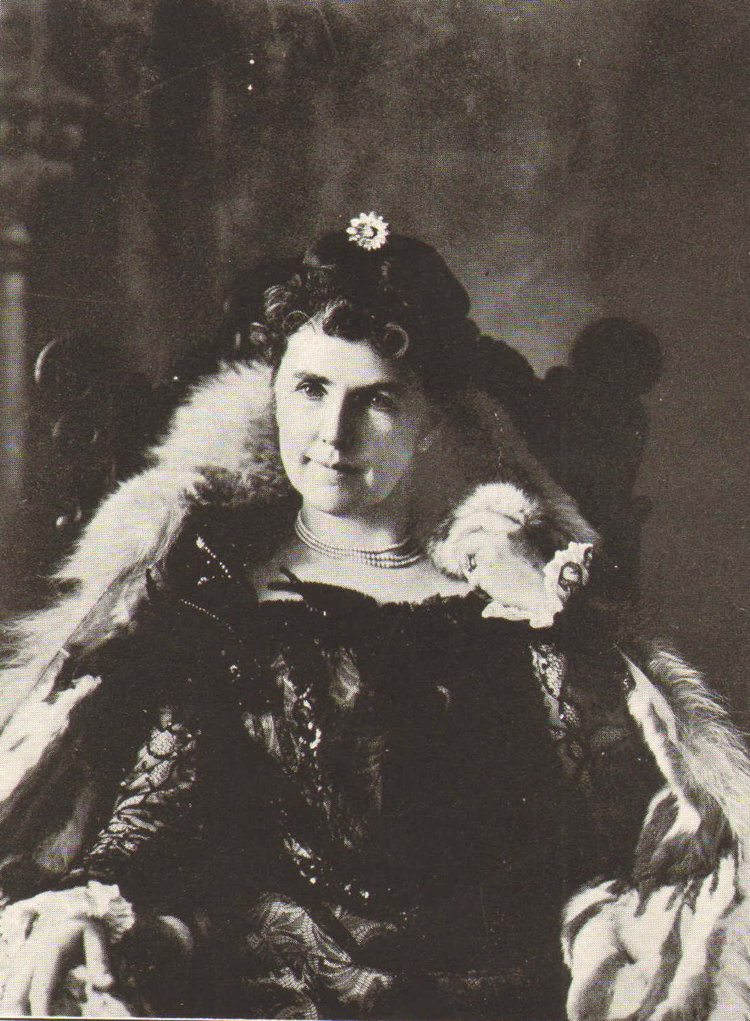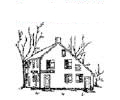Other links of interest
- Elizabeth Stevens
- Elizabeth Stevens' Will
- Greenhouse Tour, 1939, Bridgewater Normal School
- Swansea's Women in History page
Town History
"Monuments of brick and stone, they are which will remind future generations of her pubic deeds, but in the hearts
of the citizens of Swansea will be other monuments erected in gratitude for what she had done."
PORTRAIT OF A LADY
(Mrs. Elizabeth Richmond Stevens)
Written by Eleanor Mitford Eddy - January 20, 1935
Freshman at Wellesley College.
(NOTE: paper is presented as written and with page breaks)

-1-
"Fortunate is the town, city, or other community which numbers among its constituents one whose high sense of public duty resolves itself into benefactions that are practical in their conception, lasting in their nature, and designed for the upbuilding and enlightenment of the community which they serve. Thrice fortunate is it, that Swansea should have a citizen, a native of the town, still resident within its borders, and as alertly and vitally interested in its true welfare as Mrs. Frank Shaw Stevens, born Elizabeth Richmond Case." Thus read the dedicatory address, delivered on September 1, 1927, at the Joseph Case High School in Swansea, Massachusetts, which was donated by Mrs. Stevens in memory of her father, Joseph Case. Mrs. Elizabeth Richmond (Case) Stevens was widely known for her many benefactions to her native town, Swansea, Massachusetts; various Fall River institutions; and elsewhere.
She was born in the historic town of Swansea on April 22, 1849. Her mother, Eliza Gray, was the granddaughter or Colonel Peleg Sherman of the Continental Army. Elisabeth always treasured the records and will of her great grandfather. These records are well preserved at the present time, and are kept at the Swansea Public Library.
Her father, Joseph Case, was of the seventh generation from William Case, who came from England in the seventeenth century and settled in New England. Mr. Case was educated to be a teacher; she graduated in the class of 1844 from the Bridgewater Normal School. He was a poor man and kept an inn, known as Case's Hotel, which in earlier days was Gray's Tavern. It was here that the four-horse stage coaches stopped for the night on their through
-2-
route from Providence, Rhode Island to New Bedford, Massachusetts. The coaches arrived about noon of one day and left early the next morning. It was in these surroundings that Elizabeth and her sister, Mary, were born and brought up.
Little of Mrs. Stevens' childhood is actually known, as no records have ever been written. Most of her traits and life history come from stories and anecdotes told by folk who knew her as a child.
Many of the characteristics of her later life must have been present as a child. Elizabeth, always known as Lizzie, was quite witty. A few anecdotes to illustrate might be of interest. "Upon arrival at school one morning unusually late, the teacher inquired where she had been all that time, Lizzie replied: 'I have been all the way from Case's Hotel to the school house." The actual distance was about two of our normal blocks. "At Christmas time the young women of the Church were making decorations of Christmas greens. It fell to her lot to make the star. As she was completing her work, she said: 'I think this star will cause as much wonderment as the original Star of the East.'"
Elizabeth, although she was a tomboy and liked to climb fences, was a lover of pretty things, and she always admired fine clothes, tastes which she was able to gratify in later life. The beautiful things she loved numbered among them poetry; and she used to employ lines of poetry at every available time. She also liked to use long words and expression. Perhaps this characteristic love of poetry was inherited, as her aunt, Elizabeth Richmond, wrote verse. (Whether it is a coincidence that the names of these two women were alike or whether Elizabeth was named for her aunt is
-3-
not known.)
Mrs. Stevens was conceited, for she was beautiful, with a wealth of pretty hair which she liked to show. Often she would wear it hanging down her back, and if anyone asked her the reason, she would invariably say that it was good for the hair to let it hang. In spite of her good looks, however, she was a poor mixer, for she was stubborn, outspoken, often sarcastic, and proud. Her pride is manifested in the fact that she was never know in later life to mention her childhood, for she was ashamed of her poverty. Her sister, Mary, however, told of the many times that they bad gone out to pick up corncobs to sell for kindling.
In her later years, Mrs. Stevens proved herself to be an independent and brilliant business woman, who had the courage of her convictions. She was miserly in small things and always kept astrict bank account. Her sister, Mary, once said: "Lizzle holds on to the pennies, while I let them slip through my fingers." Lizzie was also very desirous of the good will of the people, and she would even give money to obtain it.
Her education began in the so-called District School in the center of Swansea. She was brilliant, and it was this brilliance and the beauty of her and her sister that attracted Mr. Stevens to them, when they were around high school age.
Mr. Stevens, in his youth, had amassed a fortune in the early stage coach days in California, and held large interests in mills of Fall River, Massachusetts, and transportation companies. His best friend, Mr. James Birch, was the president of the firm, and he was vice-president, Mr. Birch had accumulated a fortune in gold and had shipped alarge portion of it home to his wife in Swansea. He sailed three months later carrying the rest of the
-4-
money with him. All that he carried with him was lost, and he was drowned when his ship sank. Mr. Stevens hastened back to aid Mrs. Birch in straightening her affairs. He fell in love with her and married her. At her death, he inherited the Birch fortune and became the most prominent citizen of the Town of Swansea.
Mr. Stevens proved himself to be a fairy godfather to these Case girls, for he finished their education by sending Mary to a music school in Connecticut, and Elizabeth to Bridgewater Normal School. Here, in reward for her good scholarship, she was granted an extra year of study. According to school records, after her graduation, she taught school in Swansea Village at $8.00 per week. It is also said that she taught in Somerset, a nearby town.
In April 1873, she married her benefactor, Mr. Frank Shaw Stevens, who was about twice her age. After their marriage, they resided in the old Birch Mansion in Swansea.
During his lifetime, he and Mrs. Stevens made possible the erection of several buildings in Swansea that stand as beautiful memorials to their generosity, namely: the Town Hall, Christ Episcopal Church, and the Swansea Free Public Library.
After the death of her husband, April 25, 1898 But, the good work continued in abundant contributions toward the maintenance of the above named buildings. Mrs. Stevens also became the donor of two school building, one, the Frank S. Stevens School in memory of her husband and dedicated In September 1908; the other, the Joseph Case High School in memory of her father and dedicated in 1927.
The year 1927 also marked the notable gift of $75,000.00 for the construction of one of the four massive central pillars of the Washington Episcopal Cathedral in Washington. D. C. This
-5-

gift was a memorial to Henry Vaughn, architect, who was the architect for all the Swansea memorial buildings, and a dear friend of the donor. Other outstanding gifts were the Rest House where clergy and other church workers might go for rest, quiet, and change; also, the Stevens Clinic, Robert S. Goff Memorial for the care of children, the Nurses' Home at the Union Hospital in Fall River, and a greenhouse to Bridgewater Normal, her Alma Mater. The list of her other benefactions both public and private would be a long one. As she had no children of her own, she took an interest in others, quietly helping to educate those handicapped by lack of funds.
Her declining years were spent at home in the companionship of her sister, Mary A. Case, and death came on February 14, 1930 at the age of 81. The last rites were simple, and the Episcopal Service was read by the late Bishop Slattery. The body rests in the Stevens' Tomb in the pretty Village Church Yard.
Many profited by her generosity in her bequests. Her interest in education was still shown by gifts to Harvard College, Mount Holyoke College, and Wellesley College. The latter gift is known as the Jessie Goff Talcott Fund, in honor of a member of the class of 1904.
Since her death, a large, framed, photographic portrait has been hung in the Joseph Case High School entrance lobby, and a beautiful oil painting hangs in the reception room in the Nurses' home of the Union Hospital in Fall River, Massachusetts.
Mr. Albert Gardner Boyden, one of the pioneers in Education, the principal of Bridgewater Normal School, and a former teacher and friend of Mrs. Stevens, speaking at the Frank S. Stevens' School dedication said: "I think the very best product of this town is the woman who gave this building. Mrs. Stevens is one
-6-
of the very best women, a good woman. I knew her many years ago. She was interested In everything that pertained to education." To quote from IN MEMORIAM, "Monuments of brick and stone, they are which will remind future generations of her pubic deeds, but in the hearts of the citizens of Swansea will be other monuments erected in gratitude for what she had done,"
-7-
ANECDOTES
Lawyer James Brown:
One day Mrs. Stevens was in Lawyer Brown's house. The family spoke about their son being upstairs studying and translating
Latin. Mrs. Stevens remarked, "I thought I heard someone snoring."
Anna Kerrenina:
Mrs. Stevens and Miss Laura Allen were talking about a new book "Anna Kerrenina". Miss Allen said, "I have just read
'Anna Kerrenina'". Mrs. Stevens sarcastically remarked, "I thought I saw a change in you."
Little Willie (Mrs. Stevens' small brother):
Little Willie and his pals were playing in a man's back yard. They began disturbing a stone wall; finally they had torn
down the wall. The man in the house came out and told the boys they must replace every stone to its former position.
Every boy but Little Willie ran. He remained and tugged on the stones until the wall was completely replaced. He went home.
During the night he woke up with a terrific pain in his stomach. That night he died by bleeding to death internally.
Guardian Angel (her conceit): Mrs. Stevens thought herself very beautiful. One day as she stood beside the Guardian Angel Statue (in the Church Yard Cemetery) she threw her arms about the statue and said "See how much my arms resemble those of the Guardian Angel?"
Once some one asked Mrs. Stevens a question. She replied "Not knowing with a degree of accuracy, I dare not designate
-8-
for fear I might err."
Mrs. Stevens placed a passion flower on the Cross in the Church in Easter Sunday. A woman said to her that she thought it quite inopportune to put the flower on the Cross. She believed if she were put it there it should have been during Lent. Mrs. Stevens replied, "I can't even put a flower in my Church."
-9-
BIBLIOGRAPHY
Swansea Town Report
Book on Dedication of Joseph Case High School
Interviewed Miss Eddy, Librarian
Interviewed Miss Allen of Swansea and Mr. Case of Rehoboth


